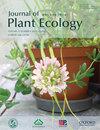Temporal change in community temporal stability in response to mowing and nutrient enrichment: Evidence from a 15-year grassland experiment
IF 3.9
2区 环境科学与生态学
Q2 ECOLOGY
引用次数: 0
Abstract
Land-use and nutrient enrichment can substantially affect biodiversity and ecosystem functioning. However, whether and how the responses of community temporal stability to land-use and nutrient enrichment change with time remain poorly understood. As part of a 15-yrs (2005–2019) field experiment, this study was conducted to explore the effects of mowing, nitrogen (N) and phosphorus (P) additions on community temporal stability in a temperate steppe on the Mongolian Plateau. Over the 15 years, N and P additions decreased community temporal stability by reducing the population stability, especially of the shrub and semi-shrub stability. However, mowing increased community temporal stability in the early stage (2005–2009) only. Nitrogen addition suppressed community temporal stability in the early and late (2015–2019) stages, whereas enhanced it in the intermediate stage (2010–2014). Phosphorus addition decreased community temporal stability marginally in the early stage and significantly in the late stage. The fluctuations of N-induced changes in community temporal stability are mainly explained by its diverse effects on species asynchrony and population stability over time. Our findings highlight the important role of plant functional groups and species asynchrony in regulating community temporal stability, suggesting that more long-term studies are needed to accurately forecast ecosystem response patterns in the context of global change.群落时间稳定性随割草和养分富集的变化:来自15年草原实验的证据
土地利用和养分富集可对生物多样性和生态系统功能产生重大影响。然而,人们对群落时间稳定性对土地利用和养分富集的反应是否以及如何随时间变化仍知之甚少。作为15年(2005-2019)田间试验的一部分,本研究旨在探讨割草、氮(N)和磷(P)添加对蒙古高原温带草原群落时间稳定性的影响。在15年的时间里,氮和磷的添加降低了群落的时间稳定性,特别是灌木和半灌木的稳定性。然而,割草仅在早期阶段(2005-2009年)增加了群落的时间稳定性。氮的添加在早期和晚期(2015-2019)抑制了群落的时间稳定性,而在中期(2010-2014)增强了群落的稳定性。磷的添加在早期略微降低了群落的时间稳定性,在后期显著降低。氮诱导的群落时间稳定性变化的波动主要是由于其对物种异步性和种群稳定性的不同影响。我们的研究结果强调了植物功能群和物种异步性在调节群落时间稳定性方面的重要作用,这表明需要更多的长期研究来准确预测全球变化背景下的生态系统响应模式。
本文章由计算机程序翻译,如有差异,请以英文原文为准。
求助全文
约1分钟内获得全文
求助全文
来源期刊

Journal of Plant Ecology
生物-植物科学
CiteScore
4.60
自引率
18.50%
发文量
134
审稿时长
3 months
期刊介绍:
Journal of Plant Ecology (JPE) serves as an important medium for ecologists to present research findings and discuss challenging issues in the broad field of plants and their interactions with biotic and abiotic environment. The JPE will cover all aspects of plant ecology, including plant ecophysiology, population ecology, community ecology, ecosystem ecology and landscape ecology as well as conservation ecology, evolutionary ecology, and theoretical ecology.
 求助内容:
求助内容: 应助结果提醒方式:
应助结果提醒方式:


